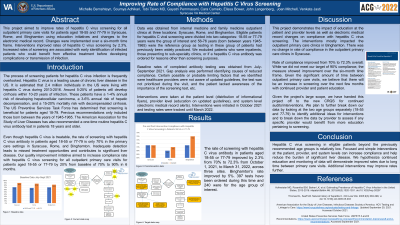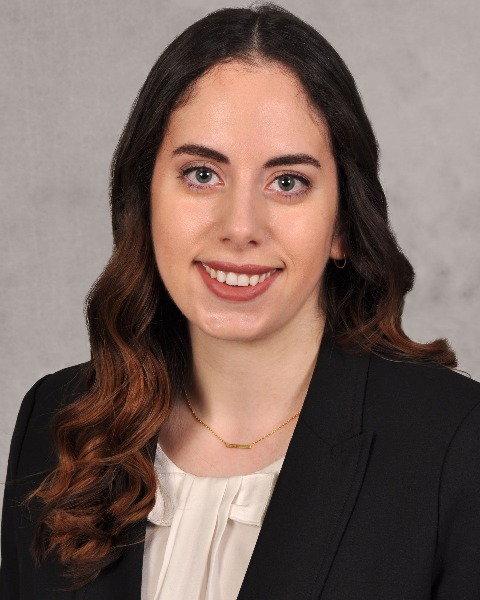Back


Poster Session C - Monday Afternoon
Category: Liver
C0490 - Improving Rate of Compliance With Hepatitis C Virus Screening
Monday, October 24, 2022
3:00 PM – 5:00 PM ET
Location: Crown Ballroom

Has Audio

Michelle Bernshteyn, MD
SUNY Upstate Medical University
Presenting Author(s)
Michelle Bernshteyn, MD1, Soumya Adhikari, MBBS1, Tobi Taiwo, MD1, Gayatri Pemmasani, MBBS1, John Langenberg, MD2, Elissa Bower, DPT2, Cara Camelo, MLS2, Joan Mitchell, MD2, Venkata Jasti, MD2
1SUNY Upstate Medical University, Syracuse, NY; 2Syracuse VA Medical Center, Syracuse, NY
Introduction: Screening patients for hepatitis C virus infection is frequently overlooked. This is a leading cause of chronic liver disease in the US. The US Preventive Services Task Force determined screening is beneficial in patients aged 18-79. Previously, only those born between 1945-1965. The American Association for the Study of Liver Diseases recommends a one-time antibody test in adults 18 years and older. Even though treatable, screening rate of hepatitis C virus antibody in patients aged 18-55 or 77-79 is only 70% in the primary care settings in Syracuse, Rome, and Binghamton. Inadequate detection leads to missed treatment opportunities and contributes to significant liver disease. Our quality improvement initiative aims to increase compliance rate with hepatitis C virus screening for all outpatient primary care visits for patients aged 18-55 or 77-79 by 20% from baseline of 70% to 90% in 6 months.
Methods: Data was obtained from internal medicine and family medicine outpatient clinics at three locations (Syracuse, Rome, and Binghamton). Eligible patients were divided into two groups: 18-55 or 77-79 years was the group of interest and 56-76 years (born between years 1945-1965) was the reference group as testing in this group of patients had previously been practiced. Completed testing from July-September 2021 served as baseline. Gap analysis was performed identifying causes of reduced compliance. Interventions were taken at the patient level (distribution of informational flyers and provider education), provider level (education on guidelines), and system level (electronic medical record alerts). Interventions were initiated in October 2021 and testing rates were tracked until the end of February 2022. IRB approval was not pursued.
Results: The rate of screening with hepatitis C virus antibody in patients aged 18-55 or 77-79 improved by 2.3% from 70% to 72.3% from October 1, 2021, to March 31, 2022, across three sites. Binghamton's rate improved by 5%. 397 tests have been ordered during this time and 240 were for the age group of interest.
Discussion: Compliance with hepatitis C viral screening is suboptimal in outpatient settings. Focused and simple interventions at the patient, provider, and system levels can increase compliance and help reduce the burden of significant liver disease. We hypothesize continued education and monitoring of data will demonstrate improved rates due to long time between primary care visits. Additional interventions may improve rates further.

Disclosures:
Michelle Bernshteyn, MD1, Soumya Adhikari, MBBS1, Tobi Taiwo, MD1, Gayatri Pemmasani, MBBS1, John Langenberg, MD2, Elissa Bower, DPT2, Cara Camelo, MLS2, Joan Mitchell, MD2, Venkata Jasti, MD2. C0490 - Improving Rate of Compliance With Hepatitis C Virus Screening, ACG 2022 Annual Scientific Meeting Abstracts. Charlotte, NC: American College of Gastroenterology.
1SUNY Upstate Medical University, Syracuse, NY; 2Syracuse VA Medical Center, Syracuse, NY
Introduction: Screening patients for hepatitis C virus infection is frequently overlooked. This is a leading cause of chronic liver disease in the US. The US Preventive Services Task Force determined screening is beneficial in patients aged 18-79. Previously, only those born between 1945-1965. The American Association for the Study of Liver Diseases recommends a one-time antibody test in adults 18 years and older. Even though treatable, screening rate of hepatitis C virus antibody in patients aged 18-55 or 77-79 is only 70% in the primary care settings in Syracuse, Rome, and Binghamton. Inadequate detection leads to missed treatment opportunities and contributes to significant liver disease. Our quality improvement initiative aims to increase compliance rate with hepatitis C virus screening for all outpatient primary care visits for patients aged 18-55 or 77-79 by 20% from baseline of 70% to 90% in 6 months.
Methods: Data was obtained from internal medicine and family medicine outpatient clinics at three locations (Syracuse, Rome, and Binghamton). Eligible patients were divided into two groups: 18-55 or 77-79 years was the group of interest and 56-76 years (born between years 1945-1965) was the reference group as testing in this group of patients had previously been practiced. Completed testing from July-September 2021 served as baseline. Gap analysis was performed identifying causes of reduced compliance. Interventions were taken at the patient level (distribution of informational flyers and provider education), provider level (education on guidelines), and system level (electronic medical record alerts). Interventions were initiated in October 2021 and testing rates were tracked until the end of February 2022. IRB approval was not pursued.
Results: The rate of screening with hepatitis C virus antibody in patients aged 18-55 or 77-79 improved by 2.3% from 70% to 72.3% from October 1, 2021, to March 31, 2022, across three sites. Binghamton's rate improved by 5%. 397 tests have been ordered during this time and 240 were for the age group of interest.
Discussion: Compliance with hepatitis C viral screening is suboptimal in outpatient settings. Focused and simple interventions at the patient, provider, and system levels can increase compliance and help reduce the burden of significant liver disease. We hypothesize continued education and monitoring of data will demonstrate improved rates due to long time between primary care visits. Additional interventions may improve rates further.

Figure: Hepatitis C Virus Screening Rates Between July 2021-March 2022 in the Syracuse, Rome, and Binghamton Primary Care Clinics
Disclosures:
Michelle Bernshteyn indicated no relevant financial relationships.
Soumya Adhikari indicated no relevant financial relationships.
Tobi Taiwo indicated no relevant financial relationships.
Gayatri Pemmasani indicated no relevant financial relationships.
John Langenberg indicated no relevant financial relationships.
Elissa Bower indicated no relevant financial relationships.
Cara Camelo indicated no relevant financial relationships.
Joan Mitchell indicated no relevant financial relationships.
Venkata Jasti indicated no relevant financial relationships.
Michelle Bernshteyn, MD1, Soumya Adhikari, MBBS1, Tobi Taiwo, MD1, Gayatri Pemmasani, MBBS1, John Langenberg, MD2, Elissa Bower, DPT2, Cara Camelo, MLS2, Joan Mitchell, MD2, Venkata Jasti, MD2. C0490 - Improving Rate of Compliance With Hepatitis C Virus Screening, ACG 2022 Annual Scientific Meeting Abstracts. Charlotte, NC: American College of Gastroenterology.
